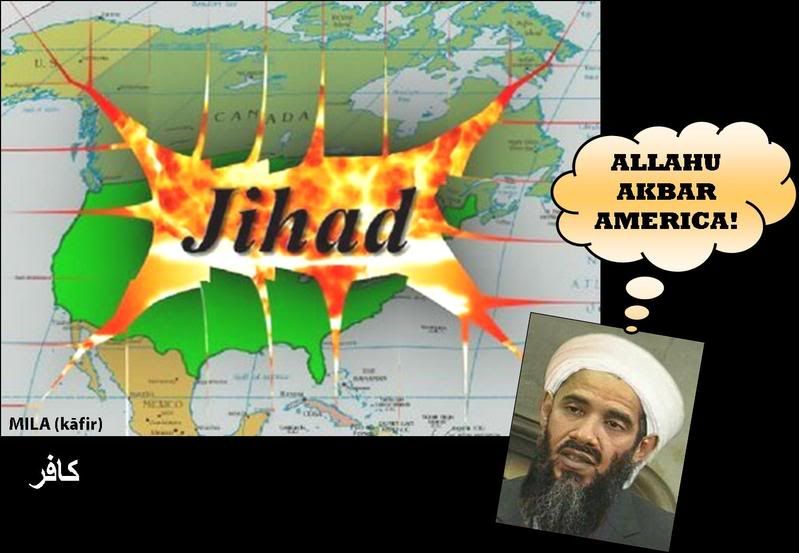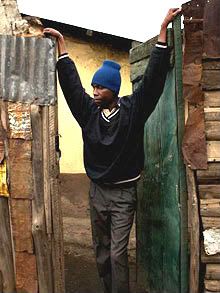
Thanks to my friend for the "art" LOL - Click here for myspace page MILA (kāfir) كافر
وقد صوت صفارات الانذار

Nothing in this world happens in a vacuum. When we discuss the momentous events unfolding in Georgia and the implications in geopolitics, we are only scratching the surface behind the “why.” Why did Georgia feel it necessary to challenge a great power and try to wrestle South Ossetia back into their control? Why is Russia so keen to interfere? Before we can fully understand the actions of individuals or of nations, we first have to understand who they are. I firmly believe that you are where you come from. So ... where does Georgia come from?
What most people don’t realize is that Georgia is an ancient civilization that rivals that of Mesopotamia or China. Their civilization began millenniums ago. If there were a people set on conquest in the old world, you can bet that Georgia’s ancestors met them on a field of battle. The success or failure of a battle meant the difference between your sovereignty, or your servitude to a conquering and often cruel principality.
The Georgians knew the ancient Greeks and the Hittites; the Medes and the Persians; the Celts also called the Phryglans and/or Mushki; the ancient Cimmerians and the Assyrians. The fought Alexander the Great and Caesar’s Roman Empire. Later by default, they were part of the Byzantine Empire. They were defeated by the Mongols and fought holy wars. Crusades and Jihad were known to them as they were fought on their farms and in their cities. In the wake of the collapsing Byzantine empire they were a rising power. They pushed the Seljuk Turks out of their lands. Then while outnumbered, they proudly crushed the resultant Jihad declared by the Seljuk Sultan Mahmud. But the fortunes of war against the Islamic sea would not always go well.
Two new Islamic Powers arose nearly simultaneously to the South and Southeast. The Ottoman Empire, and the Persian Safavid Empire. The Kingdom of Georgia would fracture into smaller kingdoms named after dominant Georgian Tribes, as the Ottomans and Safavids divided Georgia into regions of influence between them. Georgia’s population was in severe decline as they lived under barbarous conditions of butchery and extreme jizya taxation. They were an Island of Christendom nearly cut off from the rest of the Christian world. They were ragged and desperately poor. But there was one last hope. There was a new Christian power emerging to the North; Imperial Russia. And it was to them that they turned to for help. For Georgia’s survival, they would make a deal with the Devil!

While the earliest occupation of present day Georgia goes back about 1.8 million years ago, the dolmens of Abkhazia are dated to about 3000 BC. These would become part of the Colchain culture.

With Georgia uniquely situated south of the Caucasus Mountains along the Silk Road and between the Black and Caspian Seas, if there were an ancient conquering race you can safely bet that they at one time or other met them on a battlefield. Their geographic location acts as a funnel, forcing migrating people through their land.


The two main tribes and later Kingdoms that would form into modern Georgia are Colchis and Iberia. Even with multiple invasions, the two main legs of Georgia would somehow manage to retain their culture.

The Hittites, the Medes and Persians, the Cimmerians, the Babylonians, the Assyrians, the Greeks, the Romans, the Byzantines, the Mongols, they knew them all.

Whether the empire began in the South with the Parthians, the West with the Macedonians, the East with the Mongols, or the North with the Russians; Georgia has always managed to find itself either near, inside, or partially inside their borders.


The first united Georgian monarchy was formed at the end of the 10th century when Curopalate David invaded the Earldom of Kartli-Iberia. Three years later, after the death of his uncle Theodosius the Blind, King of Egrisi-Abkhazia, Bagrat III inherited the Abkhazian throne from his mother. In 1001 Bagrat inherited Tao-Klarjeti (Curopalatinate of Iberia), adding it to his domain as a result of his father David’s (there's a lot of Davids in this history) death. In 1008-1010, Bagrat annexed Kakheti and Ereti, thus becoming the first king of a united Georgia in both the east and west.


King David takes the throne at 16 years of age and reorganizes the Army. He launches a campaign to retake Georgia from the Suljuk Turks, at one point being aided indirectly by the first Crusade. When pushing out the Turks, there was a vacuum left. He invited 40000 Kipchak warriors from Alania to move with their families to Georgia. The ruler of Alania recognized himself as King David's vassal. Eventually this land would become South Ossetia.
In 1121, the Seljuk Sultan Mahmud declared Jihad on Georgia and sent a strong army under one of his famous generals Ilghazi to fight the Georgians. Although significantly outnumbered by the Turks, the Georgians managed to defeat the invaders at the Battle of Didgori, and in 1122 they took over Tbilisi, making it Georgia’s capital.


With the temporary fall of the Byzantine Empire due to the Fourth Crusade sacking Constantinople, Georgia becomes the pre-eminent power in the region. Queen Tamar takes advantage of this and adds more territory that had been under the control of the Byzantine Empire. Oddly enough, at the same time they remain relatively cordial as they shared many of the same enemies.

While I could not find an exact date for this map, it falls into this general time frame. I included this map only to demonstrate the relative weakness of a once great empire. The incessant Islamic crusades were taking their toll.

Abkhazia was relatively spared from the Mongol and Timur's invasions, which terminated Georgia's "golden age". As a result, the kingdom of Georgia fragmentize into several independent or semi-independent entities by the late 15th century. The Principality of Abkhazia was one of them. They remained Georgian in culture but would begin to change when they later came under Ottoman Influences.
Under similar circumstances, the East Slavic tribes that were Imperial Russia's roots also fell under the same Mongol Hoard. When they were conquered, the cultural center was around Kievan Rus'(major cities were Smolensk and Kiev) in modern day Ukraine; when they would reemerge, the cultural center would shift to the principality of Moscow, where the Russian empire was born. At an epic pace, Russia would extend their lands to the Pacific and wrest land away in the Northern Wars to establish ST Petersburg. Then south the the Caucasus looking for a warm water port. They were delighted to find Georgia. This was the beginning of their Black Sea fleet which would be a source of national pride for centuries.


The period between 1259 and 1330 was marked by the struggle of the Georgians against the Mongol Ilkhanate for full independence. The first anti-Mongol uprising started in 1259 under the leadership of King David Narin who in fact waged his war for almost thirty years. The Anti-Mongol strife went on under the Kings Demeter II (1270 - 1289) and David VIII (1293 - 1311). Finally, it was King George the Brilliant (1314 - 1346) who managed to play on the decline of the Ilkhanate, stopped paying tribute to the Mongols, restored the pre-1220 state borders of Georgia, and returned the Empire of Trebizond into Georgia’s sphere of influence.
After the Mongolian wars, Georgia never fully recovered. Even though they had beaten back the Mongols, their old enemies to the south lay in wait. The onslaught would be brutal under the banner of Islam.
In 1386-1403 the Kingdom of Georgia faced eight Turco-Mongolic invasions under the leadership of Tamerlane. Except in Abkhazia and Svanetia, the invasions devastated Georgia's economy, population, and urban centers.
Constantinople had finally fallen to the Islamic Ottoman Turks in 1453, completely sealing off Georgia from the rest of Christendom. In 1501 a new Muslim power, Safavid Persia arose to the southeast. Georgia faced not one empire in it’s weakened state, but two. In 1555 the Ottomans and the Safavid’s divided up Georgia into spheres of influence between them under the “Peace of Amasa” pact. Between the slaughter from the Persians and the excessive jiza tax, Georgia found themselves impoverished and ragged. With several millennia of culture behind them, it is doubtful Georgia could have survived without outside help.
Imperial Russia, a new Christian power, was emerging to the north. with the neighbors Georgia had known for a millennia vanished from the map, with their own population in sever decline; they would eventually turn to the Russians for help. They would soon discover that the trade for their survival demanded a heavy toll -bondage.
Under Ottoman Rule, Abkhazia, called Imereti in this map, became the center of piracy and the slave trade. The Ottoman navy occupied the fort city of Tskhumi, renaming it Sukhumi. Under this Muslim influence, Abkhazia culturally began to grow apart from the rest of Georgia.


Finally, King Erekle II of Kartli and Kakheti turned to Russia for help. The Russian empress Catherine the Great was keen to have a new ally against the Turks who she was currently at odds with. After signing the Treaty of Georgievsk in 1783, she sent a token army to assist. At one point, during the Russo-Turkish War in 1787, Russia pulled it’s army out of Georgia to fight elsewhere against the Turks. With the Russian troops gone, the Persian shah Agha Mohammed Khan invaded Georgia in 1795 and burnt Tablisi to the ground. Despite this, the Georgians continued to depend on Russia.

With the death of King Erkle II, there was a dispute over who should inherit the throne and one of the contestants requested assistance from Russia. The Russians under Tsar Paul I, responded by annexing Georgia on Jan 8, 1801. Later that year, the annexation was confirmed by Tsar Alexander I on September 12, 1801. Georgian envoy, Garsevan Chavchavadze lodged a protest in Saint Petersburg (Russian Capital at the time). The Russians responded by dethroning the Georgian heir to the throne, David Batonishvili and deploying General Ivan Petrovich Lasarev to act as the governor.
Russia fought against the Turks and the Persians eventually wresting all of Georgia back from them. In 1864 the Russian dominance over Abkhazia was fully established when they exiled the pro-Turkish prince of Abkhazia, the house established by Queen Tamar, Michael Sherashidze (Chachba), to Russia where he soon died.
Despite the fact Georgia had lost it’s independence, Russia did much to help Georgia by pushing the Muslims back out. When the Turkish navy landed in 1877, it instigated the second Abkhaz revolt. As a result, the Russians responded harshly. Fully 60% of the Muslim Abkhaz population became Muhajirs and fled to Ottoman possessions. The few that remained were declared a refugee population. Even with the Ottoman influence and before the Russian crackdown following the revolt, 2/3 of the people in Abkhazia were still ethnic Mingrelian Georgians.
It wasn’t until the Communists took over that this Georgian majority would be threatened under Stalin’s (a Georgian) forced 5 year resettlement plan (diversification). This resulted in the resettlement of Russians, Armenians and even Georgians into the existing Abkhaz. The 2700 year old Greek population from before Alexander the Great was completely deported in a single night.

Georgia, while still under the last of the Tsars, would experience a reawakening of their nationalism. This happened under the leadership of Prince Llia Chavchavadze, world renowned poet, novelist and orator. His struggle for a national awakening was welcomed by the leading Georgian intellectuals of that time such as Giorgi Tsereteli, Ivane Machabeli, Akaki Tsereteli, Niko Nikoladze, Alexander Kazbegi and Iakob Gogebashvili. The Georgian inteligencia's support for Prince Chavchavadze and Georgian independence is based in the millenniums old connection between the land and it’s people, shown in this declaration:
"Our patriotism is of course of an entire different kind: it consists solely in a sacred feeling towards our mother land: ... in it there is no hate for other nations, no desire to enslave anybody, no urge to impoverish anybody. Out patriots desire to restore Georgia's right to self-government and their own civic rights, to preserve their national characteristics and culture, without which no people can exist as a society of human beings."
It is this passion that the Soviets had to respect. Under the Soviet Empire, Georgia was granted semi-autonomy. Georgia became the Georgian Soviet Socialist Republic (SSR). South Ossetia and Abkhazia were granted semi-autonomy from Georgia, while still under the Georgian administration. It would remain this way until the collapse of the Soviet Union.
The collapse of the Soviet Union was not because the Soviet Union could no longer suppress it’s people. It collapsed because it could no longer compete with the Capitalist Nations of the West, primarily the United States. This, despite the fact the Russians had spies collecting data from every corner of our nation, from the technology sectors, to the military, to the government. In exasperation, Michael Gorbachev let the worms out of the can and no one could put them back in. Perestroika (restructuring) and Glasnost (openness) resulted in the revolts of all the satellite Soviet nations beginning with Poland. Within months, the Soviet Empire would dissolve.

Georgia’s long awaited dream finally came true. Georgia declared it’s independence on April 9, 1991, and with the Rose Revolution, Georgia ushered in a new era of Democracy.
The Russian history of over 600 years had seen nothing but expansion. No land was ever lost despite taking it on the chin in some of their wars. When the Communists came to power, it was in many ways, a revolution inside of a revolution. The original plan under Lenin was never what it turned out to be under Stalin. But the Socialist policies turned out to be a complete failure, so Stalin took it even further to the Left when the Communists came to power. The extreme central planning and forced communal government owned housing, and all areas of the economy under strict centralized control was no match for the freewheeling Western capitalist system. The very same “evil” system that evolved from the Monarchs, capitalism. Even with limited success with extending dominance over East Europe, the Soviet communist system itself was rotten at the core. For the first time ever, Russia (USSR) lost land.
The humiliation is something a Westerner can only imagine. All the territory gained by the very system of government they so deeply despised, was lost by the Bolsheviks! Adding to this humiliation is the fact that many of the breakaway Republics refused to join the newly created Commonwealth of Independent States. (CIS) Adding to this the fact that one “Superpower,” that held deep respect with the world was suddenly revealed to be completely impoverished. They couldn’t even afford to pay their own troops resulting in a massive sell-off of stolen soviet military equipment. How low can a superpower fall?
But for Georgia, peace would not prevail. Minority areas of South Ossetia and Abkhazia flared up into their own separatist violence, supported by the Russians from the beginning for Georgia’s audacity to secede, despite Russia’s earlier help under Catherine the Great (Catherine II). While the violence in South Ossetia was originally quelled with 100,000 refugees fleeing into North Ossetia (Alania). The official disposition of this conflict was that it ended in a draw as only a cease fire was declared, with both sides having to appear at the Russian peace conference. But in a real sense, South Ossetia had won as they now had a defacto independent country. Abkhazia turned out even worse.
The Georgian government forces ran into paramilitaries from the North Caucasus and (allegedly) from Russian forces from a base in Gudauta. The Georgian government forces were soundly defeated. This catastrophic defeat lead to the entire Georgian population of 300,000 being forced to flee in the wake of the massacre of 14,000 Georgians. With the separatists success in Abkhazia, the insurgent Zviad Gamsakhurdia returned from exile and capitalized on the governments disarrayed forces. He overran western Georgia before the Russians openly intervened. For payment of Russian support, Georgia was obligated to join the CIS.
Adding to the problems in Georgia, the Russian war with their neighbor Chechnya, another break-away Republic, caused considerable friction between Russia and Georgia. Russia accused Georgia of harboring Chechen guerrillas. Further friction was caused by Shevardnadze's close relationship with the United States, which saw him as a counterbalance to Russian influence in the strategic Transcaucasus region.

Adding to Moscow’s chagrin was Washington’s high-profile visit to Georgia. On 9-10 May 2005 Georgia was visited by the US President George W. Bush, who met Mikheil Saakashvili and a group of Georgian parliamentarians, and addressed tens of thousands of the Georgian people at Tbilisi Freedom Square.
Georgia became a major recipient of U.S. foreign and military aid, signed a strategic partnership with NATO and declared an ambition to join both NATO and the EU. In 2002, the United States sent hundreds of Special Operations Forces to train the Military of Georgia - a program known as the Georgia Train and Equip Program. Perhaps most significantly, the country secured a $3 billion project to build a pipeline carrying oil from Azerbaijan to Turkey via Georgia (the so-called "Baku-Tbilisi-Ceyhan" or BTC pipeline). In addition Georgia sent 2000 troops to Iraq to assist with the coalition military operations of those Georgia was trying to align and integrate with.
So now you have the big blow-up. So what really happened? This is what I believe.
Conditions:
1. Russia is still reeling over losing all their possessions with the collapse of the Soviet Union.
2. Russia’s two hundred year old relationship with Georgia makes them resent the fact that Georgia is pulling away from them and towards their old Cold War adversary.
3. Russia’s economy is stronger with the seizure of the Yukon Oil Company.
4. Europe receives 1/3 of their oil from Russia.
5. Russia accuses Georgia of supporting the separatives in Chechnya.
6. Georgian President Mikheil Saakashvili ran for office on the pledge of restoring the break-away territories that had been Georgian for 5 millennia.
7. Russia was waiting with a pre-positioned force that would land from the Black Sea, opening up a second front from a different direction from where all Georgia's troops were. The logistics for this sort of landing is extensive. There is NO way the Russians could have pulled this mission together in a few days unless they had prepared for it in advance. That's not a guess, that's a physical fact. Consider that it's not just thousands of soldiers jumping on a boat. What about all the food to feed them? What about the water? What about the communications gear that needs to be set up in base stations? What about the re-supply of ammo that will be quickly used up? What about their personal gear? What about their vehicles? What about the fuel for those vehicles? Repair parts? See, it's the logistics that slow down a good tactical plan! It takes the US that long to do it with highly trained "Ready Reaction" airborne forces that can deploy anywhere in the world on short notice.
8. Russia had “peacekeepers” in South Ossetia that had sided with the separatives.
9. Russia had the rail connections necessary to reinforce the “peacekeepers” almost instantly. Most likely, those forces were also pre-positioned.
10. Russia was granting passports (not visas) and Russian citizenship to anyone in South Ossetia who wanted it.
11. Georgia has the most solid claim to South Ossetia than to Abkhazia. This would only intensify Georgia’s will to act.
12. Georgia had signed letters of intent and cooperation with Western powers that Georgia hoped would protect them.
13. Russia knows the US is tied up in Iraq and needs Russia for the issue with Iran.
14. Russia knows that Europe is dependent on them for oil. Does anyone remember Ronald Reagan’s disapproval of the first pipeline that was connected between Russia and Western Europe?
Considering these conditions I believe the actions of Georgia were provoked. The Russians did a calculated action to reestablish hegemony over their former satellite States. They knew that despite Georgia’s close alliance with the US and the West, we would be loath to take physical action. This lack of action would put serious doubts into the rest of the breakaway Republics. Exactly how much may they really be able to depend on our commitments of security to them?
With all the pieces in play, all Russia had to do was to have the South Ossetians start sniping at the Georgians in force. In order to prepare the world for decisive Russian action, they ran huge pieces in their own newspapers that charged Georgia with genocide. A claim that could not be backed up by independent sources. No one EVER accused the Russians of being poor Chess Players. I have every reason to believe that Russia had planned to go all the way to Tiblisi. I believe it was the threat of a new Cold War that made them blink. Now, instead of getting all of Georgia, they are going to settle for acknowledging the break-away territories, mostly in response to our recognition of Kosovo (which I believe was a colossal mistake.) What they were after they still may achieve with our relative inaction, hegemony over their old “stomping grounds,” and some semblance of respect.





















